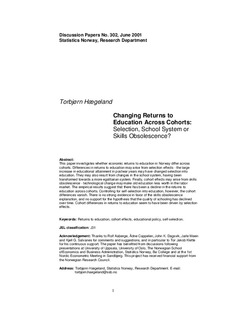| dc.contributor.author | Hægeland, Torbjørn | |
| dc.date.accessioned | 2011-11-25T18:54:18Z | |
| dc.date.available | 2011-11-25T18:54:18Z | |
| dc.date.issued | 2001 | |
| dc.identifier.issn | 1892-753x | |
| dc.identifier.uri | http://hdl.handle.net/11250/180087 | |
| dc.description.abstract | Abstract:
This paper investigates whether economic returns to education in Norway differ across cohorts. Differences in returns to education may arise from selection effects - the large increase in educational attainment in postwar years may have changed selection into education. They may also result from changes in the school system, having been transformed towards a more egalitarian system. Finally, cohort effects may arise from skills obsolescence - technological change may make old education less worth in the labor market. The empirical results suggest that there has been a decline in the returns to education across cohorts. Controlling for self-selection into education, however, the cohort differences vanish. There is no strong evidence in favor of the skills obsolescence explanation, and no support for the hypothesis that the quality of schooling has declined over time. Cohort differences in returns to education seem to have been driven by selection effects.
Keywords: Returns to education, cohort effects, educational policy, self-selection. | no_NO |
| dc.language.iso | eng | no_NO |
| dc.publisher | Statistics Norway, Research Department | no_NO |
| dc.relation.ispartofseries | Discussion Papers;No. 302 | |
| dc.subject | Returns to education | no_NO |
| dc.subject | Education | no_NO |
| dc.subject | Educational policy | no_NO |
| dc.subject | Norway | no_NO |
| dc.subject | JEL classification: J31 | no_NO |
| dc.title | Changing returns to education across cohorts : selection, school system or skills obsolescence? | no_NO |
| dc.type | Working paper | no_NO |
| dc.subject.nsi | VDP::Social science: 200::Economics: 210::Economics: 212 | no_NO |
| dc.source.pagenumber | 48 s. | no_NO |
